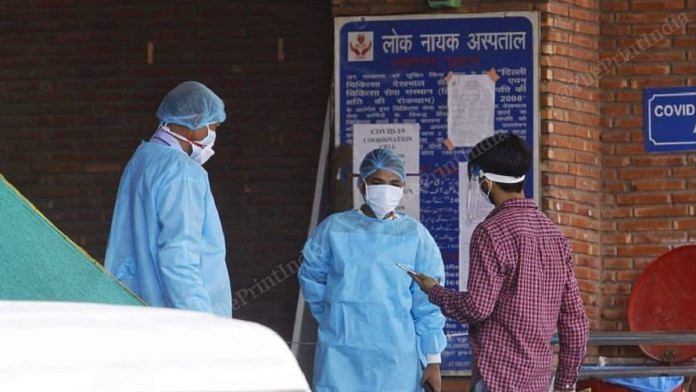New Delhi: Hospitals across Delhi are struggling with the challenges thrown by the rising coronavirus cases — low manpower and stretched resources.
As of 22 June, Delhi reported 59,746 cases, of which 24,558 are active and 2,175 have died.
At the Lok Nayak Jai Prakash (LNJP) Hospital, Delhi’s largest Covid-19 facility, the situation isn’t very different.
In fact, some families who admit their kin at the hospital, say they don’t hear back until one of two outcomes occur — the patient is being discharged or they have died.
For Rakesh Kumar, the interim silence was crippling. His 75-year-old father, Jaswant Singh, was admitted to the hospital on 13 June with a fever and cough. Jaswant didn’t have a phone, and the two days before Kumar heard back from the hospital were filled with anxiety.
“The day he was admitted, he used someone else’s phone to say he was doing okay, but I never heard back from him for the next two days. Then I got a call from the hospital last night saying he was dead,” Kumar told ThePrint last week.
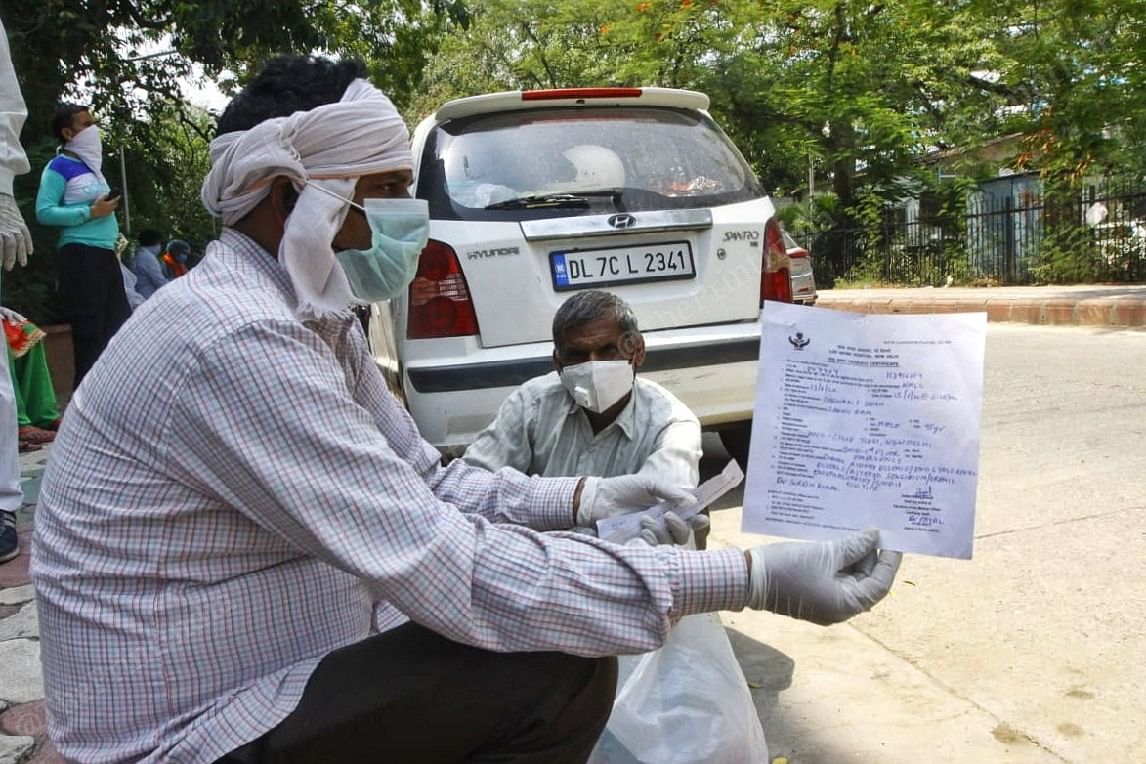
The LNJP hospital made all of its 2,000 beds available to Covid-19 patients, turning it into one of the country’s largest coronavirus facilities. But as the number of cases climbed, Delhi’s shortcomings in terms of tests, infrastructure, and healthcare workers became evident at the state-run hospital, warranting a visit by Home Minister Amit Shah on 16 June.
Authorities have stated there has been no negligence, but issues of communication — between doctors, patients, families, and the administration — persist across the 30-acre complex, sometimes with devastating results. ThePrint had reported how the bodies of two Covid-19 patients were mixed up at the LNJP mortuary.
The bad press hasn’t helped the hospital either, which has seen a drop in admissions. But several patients currently in LNJP, though admit there are issues, say the overall care is fine.
Also read: How ‘overconfident’ Delhi made a mess of Covid fight, forcing Modi govt to pick up the pieces
Patient-family-hospital communication
Rakesh Kumar, a daily wage earner, said he didn’t expect such a huge communication gap when it came to finding out his father’s condition.
“I went to the guards, chief medical officer, medical superintendent, and countless doctors to ask about his condition while he was admitted, but none of them could give me an answer,” Kumar said, holding out his father’s death certificate. “The only response I got was after he died.”
The certificate listed several causes for Singh’s death, including chronic kidney disease and Covid-19.
Like Kumar, there are many low-income families who seek treatment at the hospital, which has been catering to the needy since the time of Partition.
But, due to the highly infectious nature of the pandemic, families aren’t allowed to stay with patients, who often are left with no means to contact their loved ones.
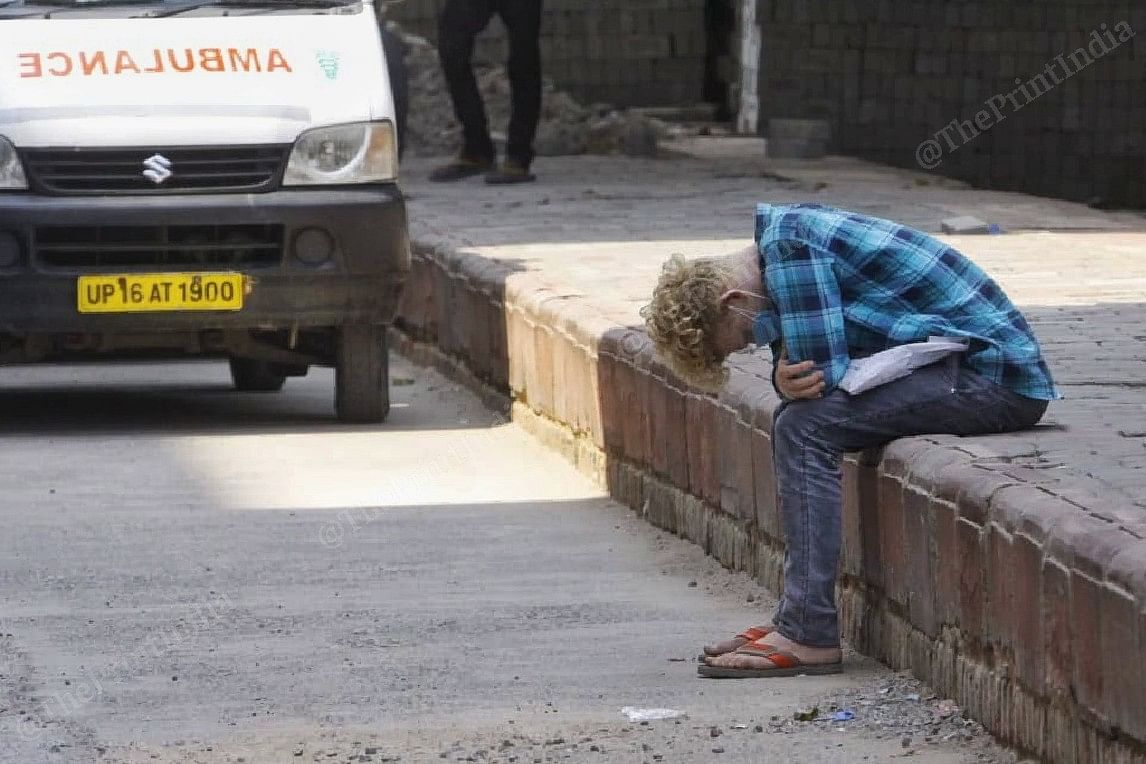
Pawan Singh, whose father was admitted to LNJP, said he struggled to find out which doctor was attending to his father. “I called all the helpline numbers to find out who my father’s doctor was, but they either didn’t work or no one picked up. He’s an old man, and he’ll tell me things are okay, but we should know which doctor is in charge,” Pawan told ThePrint.
Sonia Gupta’s 50-year-old mother was similarly cut off from the family.
In desperate need of dialysis, she moved from Safdarjung Hospital to other hospitals seeking treatment before being referred to LNJP Hospital.
“We didn’t know this was a Covid-19 only facility. She desperately needed dialysis and they accepted her as a patient. We escorted her to the ward but we were ushered out. We had the phone and she didn’t,” said Gupta.
“In a matter of four hours, she died. I don’t think she got treatment on time,” she claimed.
The death certificate, written in English, says Gupta’s mother was a Covid-19 suspect patient, a fact the family disputes.
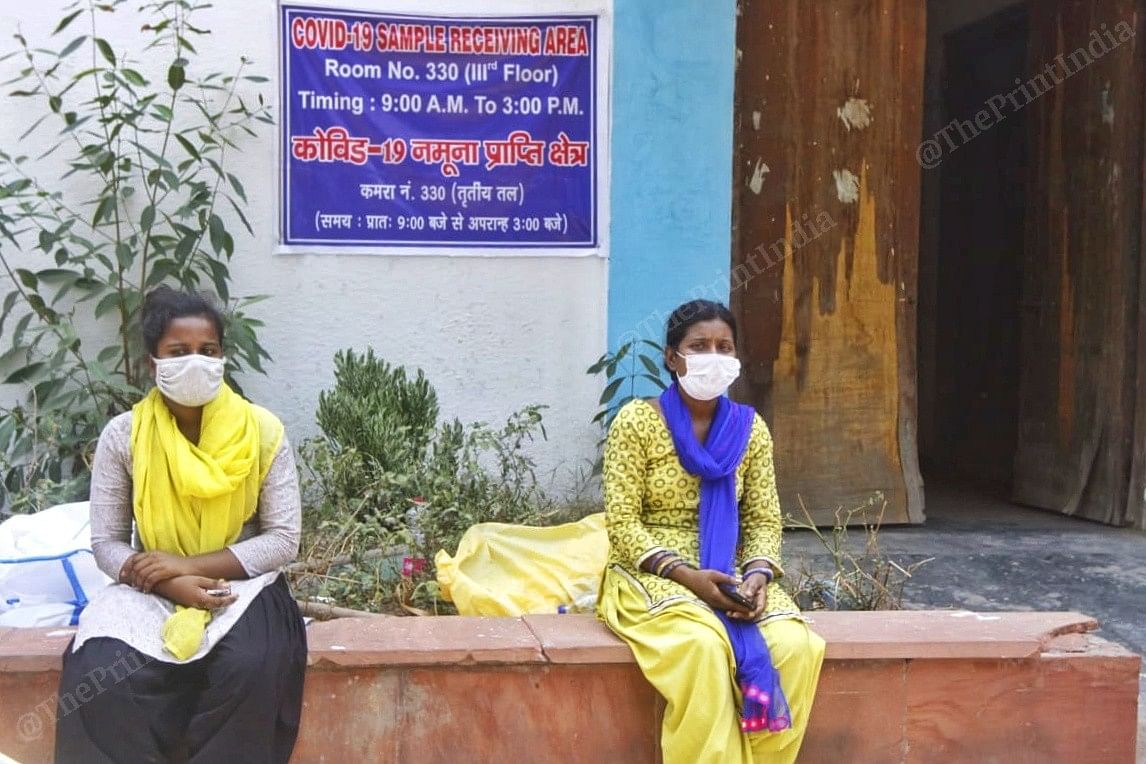
Chief Medical Officer Dr Ritu Saxena said the hospital did not admit anyone who is not a confirmed or suspected Covid-19 patient. “The hospital is following all protocols and procedures. We are working on improving lapses in communication,” she told ThePrint.
Talking about the challenge families face in communicating with patients, Dr Saxena said the hospital was working on devising a better system.
“We have already set up a helpline for families who want information. If a patient gets very sick, we want to send daily updates of patients to relatives through WhatsApp, and are in the process of setting this up,” she said.
Also read: Why Delhi’s Covid patients are running from pillar to post in search of a hospital bed
Negative publicity
Such incidents have not helped the hospital’s public image, and has resulted in a dip in admissions and referrals in the last week, said Dr Saxena.
In fact, days before Home Minister Amit Shah made his surprise visit, videos of an unclothed, unattended body in a ward with patients were widely shared. Before that, reports and testimonies of bed shortages and inadequate oxygen supply flooded social media. Nurses had also threatened to go on strike because they weren’t provided proper accommodation while on Covid duty.
As of 22 June, 718 of its 2,000 beds were occupied, according to Delhi’s Corona app.
“Fewer people are coming to the hospital because of media coverage. They must be going to other hospitals or staying at home,” Dr Saxena said.
According to an affidavit submitted in the Supreme Court in response to the video of the body in a ward, of the over 3,000 patients admitted since early April, as many as 2,013 recovered and were sent home, while about 2 per cent died.
The Supreme Court, which had taken suo motu cognisance of the issue, had come down heavily on the hospital on 12 June, saying, “They (bodies) are being treated worse than animals.”
Also read: Delhi’s Covid positivity rate sees a dip in just a few days as number of tests goes up
Managing with limited resources
On the day his father Hari Singh was admitted to the hospital, Pawan Singh claimed on Twitter his father wasn’t given adequate oxygen supply. But 50-year-old Hari Singh, currently in ward number 7(B), told ThePrint the problem was resolved quickly, and that the treatment he ultimately received was satisfactory.
Patient name -Hari Singh. LNJP hospital .
Surgical Ward No-7 (B) and Bed No-19 problem -Respiratory disorders
Breathing issue
Need oxygen support
Age 50 yrs
Mob -9911737529/ 9015243112
— PawanKushwaha (@pawankushwaha9) June 14, 2020
“On the first day, I was given oxygen on and off, and it was a little uncomfortable but I managed. Now they’ve kept a cylinder next to me and I can use it whenever I like. I’m speaking to you now without any oxygen,” he told ThePrint over the phone.
According to the Supreme Court affidavit, submitted on 16 June, all 2,000 beds have oxygen support. Of these, 1,200 of them share 600 oxygen cylinders, which effectively means one cylinder services two beds.
A senior doctor at LNJP told ThePrint that the shortage of staff and supply of oxygen often leads to patients waiting long hours before they are supplied with the oxygen they need.
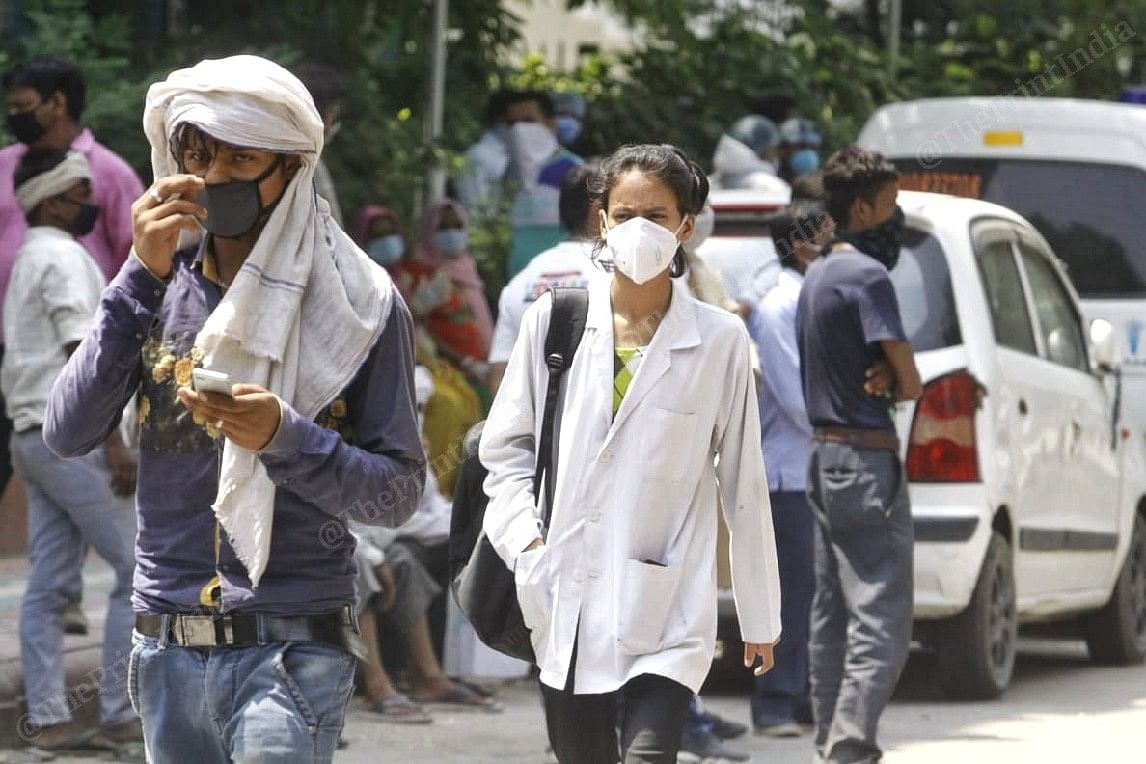
“The bathroom isn’t cleaned very well, and when I was short of breath at the time of admission, I had to wait for oxygen. But apart from that, we get served food on time and there are no other major issues. The ward I am in is not dirty,” said 65-year-old Lal Singh.
The hospital is also facing an acute shortage of nursing, nursing orderly, and sanitation staff.
“The biggest issue is staff. LNJP is a teaching institution, which means it has a greater strength of healthcare workers than other stand-alone hospitals. But we haven’t seen the (virus) peak yet, and without staff, who will care for the patients?” said a resident doctor on the condition of anonymity.
“Lack of staff was a problem at the beginning, too. There were not enough nursing orderly staff and stage 4 staff who dispose off of bodies. It will only get worse now,” the resident added.
(With inputs from Abantika Ghosh)
Also read: Delhi’s LNJP hospital fears staff shortage ahead of ‘Covid peak’ as 150 doctors get exam leave


